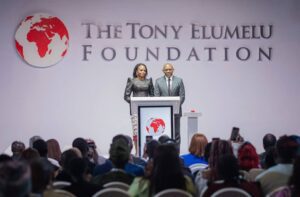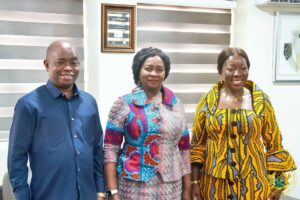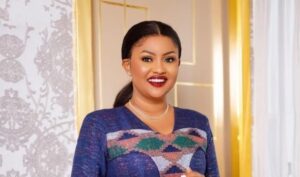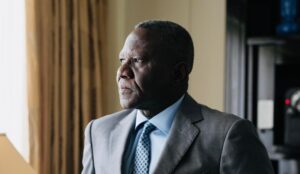
Source: Ghanaija
In the heart of Los Angeles, the epicenter of Hollywood’s glittering world, a young actress named Mia Rivera looked out from her penthouse suite. The city below was bustling with energy and the promise of fame. Mia had spent the last few years climbing the treacherous ladder of stardom, her beauty and talent propelling her to heights she had only dreamed of as a child.
Miles away, in the vibrant city of Lagos, Nigeria, a young woman named Aisha Okafor admired Mia’s latest movie poster. Aisha, an aspiring fashion designer, found herself captivated by the beauty and grace of Hollywood stars like Mia. Their flawless skin, perfectly styled hair, and elegant clothing set a standard that Aisha felt compelled to emulate.
Meanwhile, in Nairobi, Kenya, a teenage girl named Wanjiku Njoroge was scrolling through her social media feed. Her eyes lingered on images of Hollywood celebrities attending glamorous red carpet events. The sharp cheekbones, slender figures, and immaculate makeup of these stars seemed a world apart from her reality. Yet, Wanjiku couldn’t help but measure herself against these images, wishing she could transform herself into their likeness.
In Cape Town, South Africa, Thandiwe Mbatha, a beauty influencer, was busy preparing her next video. Thandiwe had garnered a substantial following by teaching her viewers how to achieve the latest beauty trends popularized by Hollywood. From contouring techniques to the perfect smoky eye, her tutorials were eagerly consumed by young women across the continent. Thandiwe often pondered the deep impact Hollywood had on beauty standards worldwide, including her own.
Back in Lagos, Aisha sat at her sewing machine, fabric draped around her. She was designing a new dress, inspired by a gown she had seen on Mia Rivera at a recent awards show. Aisha dreamed of the day her designs would grace red carpets and magazine covers. She wanted her creations to make Nigerian women feel as glamorous as their Hollywood idols. Yet, she struggled with the notion that beauty had become synonymous with Western ideals.
Wanjiku, on the other hand, felt a growing frustration. She loved her rich, dark skin and coiled hair, but the persistent barrage of Hollywood’s beauty ideals made her question her own appearance. She began experimenting with skin-lightening creams and straightening her hair, yearning for the approval she believed would come with looking more like the celebrities she admired.
One day, as Thandiwe was filming another makeup tutorial, she paused to reflect on her own journey. She remembered the time when she felt inadequate, her confidence eroded by the relentless comparisons to Hollywood stars. However, she had since found a way to blend the beauty trends with her African heritage, creating a unique style that celebrated her roots while embracing global influences.
Aisha’s designs were beginning to gain attention. She had incorporated traditional Nigerian patterns with contemporary styles, creating a fusion that was both modern and culturally rich. Her first major break came when a local celebrity wore one of her dresses to a high-profile event. Aisha was overjoyed, not only because her work was being recognized, but also because it represented a step towards redefining beauty standards in Nigeria.
In Nairobi, Wanjiku’s journey took a different turn. After experiencing the negative effects of skin-lightening products, she began to educate herself on the importance of self-love and acceptance. She found solace in online communities of African women who celebrated their natural beauty. Inspired, Wanjiku started a blog, sharing her experiences and encouraging others to embrace their unique features.
Thandiwe, meanwhile, decided to use her platform to promote a more inclusive definition of beauty. She began collaborating with local artists and beauty brands, showcasing products and styles that resonated with African beauty standards. Her influence grew, and she became a voice for change, advocating for a broader representation of beauty in media and advertising.
As Mia Rivera prepared for another movie premiere, she couldn’t help but think about the impact of her image. She had recently visited Ghana for a film shoot and was struck by the beauty and diversity of the people she met. Mia realized that her fame came with a responsibility to promote a more inclusive and diverse representation of beauty. She began using her social media platforms to highlight different cultures and beauty practices from around the world.
Back in Lagos, Aisha’s fashion line was thriving. Her designs were featured in international fashion shows, and she became a role model for young Nigerian girls. Aisha used her success to promote the idea that beauty comes in many forms, encouraging women to celebrate their individuality.
In Nairobi, Wanjiku’s blog turned into a popular online community. She hosted events and workshops, teaching young girls about self-confidence and the importance of embracing their natural beauty. Wanjiku found fulfillment in helping others, and her story inspired many to question and redefine the beauty standards they had once accepted without question.
Thandiwe, now a well-known influencer, continued her mission to diversify the beauty landscape. She launched her own makeup line, designed to complement a wide range of skin tones. Thandiwe’s brand celebrated African beauty, and her products became a staple in makeup kits across the continent.
Hollywood’s influence on global beauty standards remained undeniable, but the efforts of individuals like Aisha, Wanjiku, and Thandiwe were beginning to create ripples of change. They proved that while the allure of Hollywood was strong, there was immense power in embracing and celebrating one’s unique heritage and identity.
As Mia Rivera stepped onto the red carpet that night, she did so with a renewed sense of purpose. She understood that true beauty was not about conforming to a single ideal, but about celebrating diversity and encouraging authenticity. And as the cameras flashed and fans cheered, Mia hoped that her influence could help pave the way for a more inclusive and accepting world.








